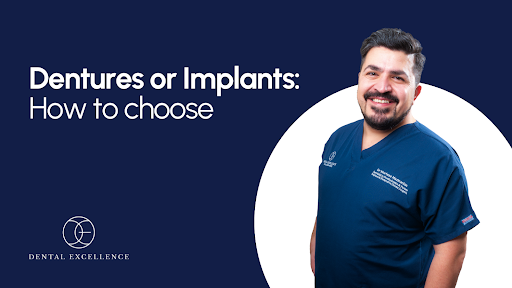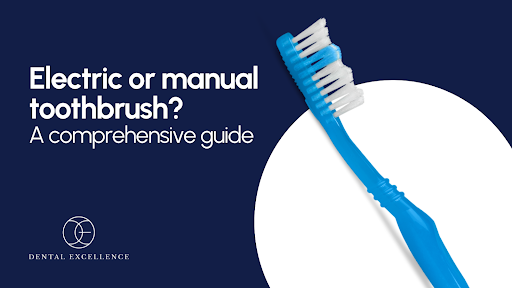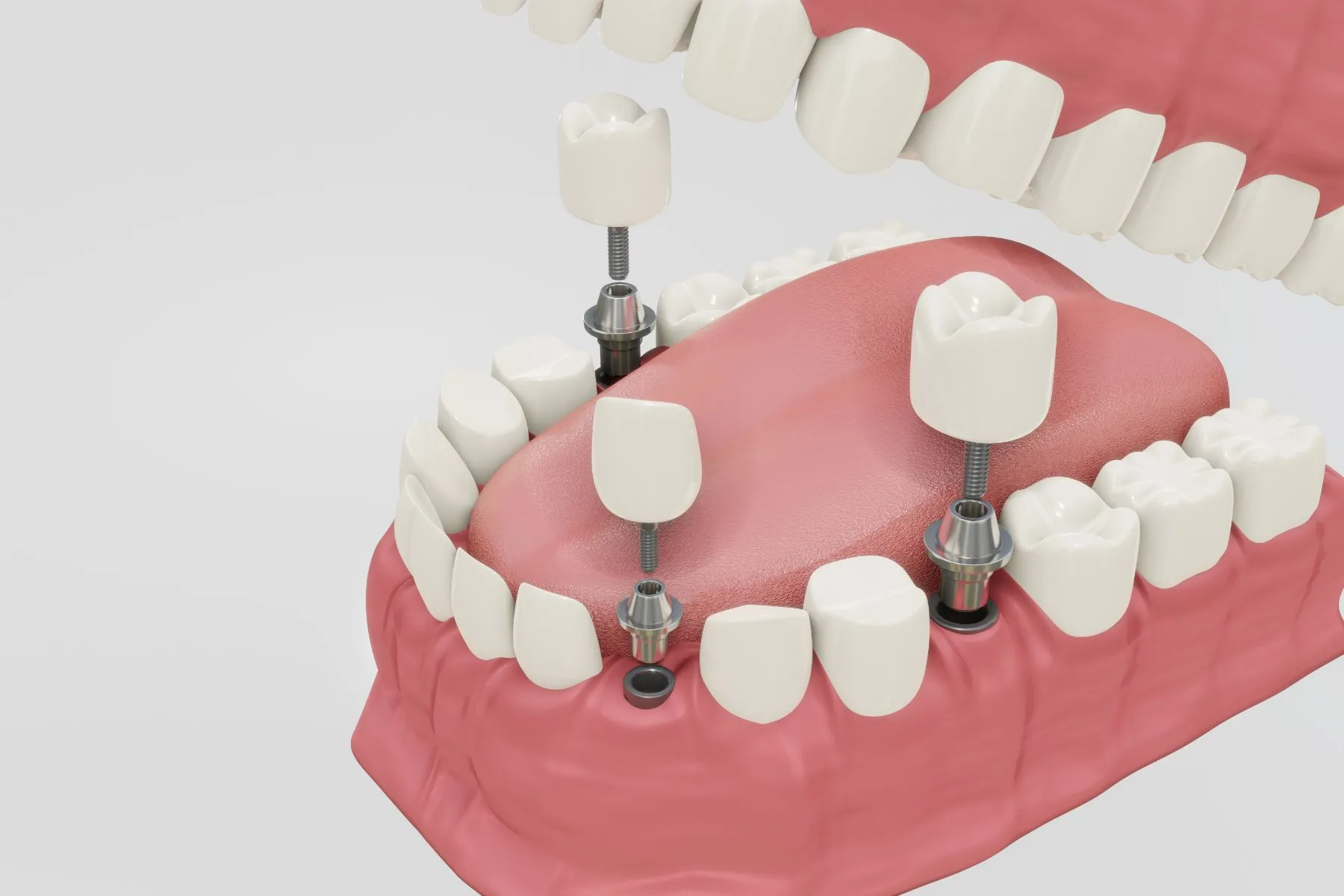We understand that the idea of undergoing dental implant surgery might sound intimidating. You’re not alone in wondering, “Will this hurt?” It’s a natural concern. The truth is, while dental implants involve surgery, most patients are pleasantly surprised by how comfortable the process is.
Today’s advanced techniques and pain management methods are designed to make sure you feel at ease from start to finish. We’re here to walk you through what to expect and to reassure you that with the right care, you can restore your smile with minimal discomfort.
What does the dental implant process look like?
When thinking about dental implants, it’s helpful to know exactly what happens at each stage. This can remove some of the mystery and help reduce anxiety. The entire procedure is broken down into manageable steps, each designed with your comfort and long-term success in mind.
Initial consultation
This is your first step and it’s completely painless. During this visit, we’ll assess your oral health to see if you’re a candidate for implants. Using X-rays and possibly a CT scan, we’ll take a detailed look at your bone structure. We’ll discuss your medical history, any medications you’re on, and your expectations. It’s a relaxed conversation, and there’s nothing to worry about at this stage.
Placement of the implant
Here’s where the surgery happens, but don’t let that word scare you. With modern techniques and local anesthesia, you won’t feel any pain during this step. Most patients are surprised to find it far more comfortable than they imagined. Local anesthesia numbs the area, and if you’re feeling particularly nervous, sedation options are available to help you feel calm and relaxed. During the procedure, the implant—a small titanium post that will act as your tooth’s new “root”—is placed into the bone. You may feel some pressure, but not pain.
Healing phase
Over the next few months, your bone will naturally grow around the implant in a process called osseointegration. This ensures the implant is secure and ready to support your new tooth. During this time, you might experience minor swelling or tenderness, but it’s usually quite manageable. We’ll guide you through this phase with detailed aftercare instructions to make sure you stay comfortable.
Placing the crown
Once the implant is fully integrated, we’ll attach the crown or bridge. This part of the process is straightforward and typically doesn’t require anesthesia. It’s the final step to completing your new, natural-looking smile.
Pain management
If pain is what’s holding you back, let’s talk about how we manage it. The goal is to make sure you feel as comfortable as possible during and after your procedure.
Local anesthesia
During the surgery, local anesthesia will completely numb the area around the implant site. You won’t feel pain, though you might be aware of some pressure or movement. We’ll communicate with you throughout the process to ensure you’re comfortable.
Sedation options
If the thought of surgery makes you feel anxious, there are sedation options available. These range from oral sedatives that help you relax to IV sedation for those who want a deeper sense of calm. These options allow you to be calm throughout the procedure, with little to no memory of it afterward.
Post-surgery care
After the anesthesia wears off, it’s normal to experience some mild discomfort. Most patients compare it to the feeling of having a tooth extracted. Pain relievers, like ibuprofen, are typically all you need to manage this. We’ll give you clear instructions on how to care for the area, and most patients find that within a few days, the discomfort subsides significantly.

The recovery: What can you expect?
One of the most reassuring things about dental implants is that recovery tends to be much smoother than people anticipate. Most discomfort occurs in the first 48 hours after surgery and is easily managed with over-the-counter pain relief. Here’s what you can expect.
Swelling and tenderness
A little swelling or bruising is normal and should subside within a few days. Using cold compresses on the outside of your cheek can help reduce swelling and keep you comfortable.
Diet modifications
For the first few days, you’ll need to stick to soft foods—think soups, smoothies, and yogurt. Avoid anything too hot, cold, or crunchy that could irritate the surgical site. As your mouth heals, you can gradually return to your normal diet.
Pain management
We’ll provide you with detailed instructions for managing any post-operative discomfort. Most patients find that pain is minimal and subsides within a week. If you experience anything unusual or your pain persists, we encourage you to contact us.
Why dental implants don’t hurt as much as you think
It’s completely normal to feel anxious when facing the idea of dental implant surgery. For many people, the thought of any kind of oral surgery brings up fears about pain and discomfort. However, when it comes to dental implants, you might be relieved to know that the experience is often much easier than anticipated. In fact, most patients report that the discomfort is far less than what they expected. Here’s why dental implants are more comfortable than you might think:
The bone has fewer nerves
One of the most reassuring aspects of dental implant surgery is the fact that the implant is placed directly into the jawbone, which has far fewer nerve endings than the soft tissues of your gums. This is important because pain is typically associated with nerves, and the fewer nerves there are, the less pain you’ll experience. When we place an implant, we are working primarily within the bone, meaning that the procedure itself often results in much less discomfort than other dental surgeries that involve more sensitive areas of the mouth.
It’s not uncommon for patients to feel some pressure during the procedure, but because the bone itself doesn’t have as many nerves, it’s typically not painful. The surrounding soft tissues, like the gums, may be slightly sore after the surgery, but this is usually manageable with over-the-counter pain relief and tends to subside quickly.
Precision placement reduces discomfort
Another reason dental implant surgery is more comfortable than expected is due to the precision of the procedure. Today’s dental technology allows us to plan and perform the surgery with incredible accuracy. Advanced imaging techniques, such as 3D cone beam CT scans, give us a detailed view of your jaw structure before the procedure even begins.
This allows us to map out exactly where the implant should be placed, minimizing disruption to the surrounding tissues. The more precise we can be, the less trauma there is to the gums and bone, which directly translates into less post-operative discomfort for you. This precision also shortens the healing time, so you’ll be back to your normal activities more quickly.
In fact, many patients are surprised by how smooth the entire process is. With such careful planning, the surgery itself is often quicker and more straightforward than expected.
Modern pain management innovations
We understand that pain is a top concern for patients considering dental implants, and that’s why we prioritize your comfort at every stage. Modern pain management techniques have revolutionized the way we approach dental implant surgery. Before the procedure, we use local anesthesia to completely numb the area where the implant will be placed. This ensures that you won’t feel any pain during the surgery itself. Some patients may feel a bit of pressure, but this is usually mild and nothing to worry about.
For patients who feel especially anxious about the surgery, we also offer sedation options. These can range from oral sedatives to help you relax, to IV sedation for those who prefer to be in a deeply relaxed state during the procedure. These options allow you to remain calm and comfortable throughout the surgery, with little to no memory of the process afterward.
After the surgery, most patients find that over-the-counter pain relievers like ibuprofen are more than enough to manage any post-operative discomfort. The pain is often compared to the feeling of having a tooth extracted, and it usually peaks within the first 24 to 48 hours before quickly subsiding.
In many cases, patients feel more relief than pain after getting dental implants because they’re finally free from the discomfort or frustration caused by missing or damaged teeth. Knowing that they are on their way to a fully restored smile brings a sense of relief and excitement that far outweighs the brief period of post-surgical discomfort.
It’s understandable to feel nervous about dental implants, but the reality is that the pain associated with the procedure is usually mild and short-lived. With fewer nerves in the jawbone, advanced precision techniques, and modern pain management strategies, we can ensure that your experience is as comfortable as possible.
Dental implants are more than just a procedure—they’re an investment in your long-term health, confidence, and well-being. Restoring your smile doesn’t have to mean enduring significant pain. Our goal is to make the process smooth and worry-free, so you can enjoy the many benefits that come with having strong, secure, and natural-looking teeth again. If you have any concerns or questions about the pain associated with dental implants, we’re here to help and guide you every step of the way.

The benefits outweigh the discomfort
At the end of the day, while the thought of dental implants may cause concern, the brief discomfort associated with the procedure is minimal compared to the long-term benefits you’ll experience. Dental implants provide a permanent, stable solution that feels and functions just like your natural teeth, enhancing not only your smile but also your overall well-being. When considering the lasting advantages, the initial healing period seems like a small price to pay for a lifetime of comfort and confidence.
Unlike other restorative options such as dentures or bridges, dental implants offer a permanent solution. Once the implant is securely placed and the final crown is attached, it becomes a fixed part of your mouth. You’ll be able to eat your favorite foods, speak clearly, and smile without hesitation. There’s no need to worry about the implant moving or becoming loose—it’s designed to stay firmly in place, giving you the same confidence you would have with your natural teeth.
For many patients, this reliability is life-changing. Instead of dealing with the daily hassle of removing and cleaning dentures, or worrying about the integrity of a bridge, you can enjoy the simplicity of caring for your implants just like you would your natural teeth. This makes dental implants one of the most popular choices for those looking for a permanent, low-maintenance solution.
One of the main concerns patients have when considering dental implants is how they will feel. Will they be as comfortable as my natural teeth? Will they affect my ability to chew or speak? The good news is that dental implants are designed to mimic the function of your natural teeth as closely as possible.
Because the implant is securely anchored into the jawbone, it doesn’t shift or move like dentures might. This means you can chew and speak naturally, without any discomfort or embarrassment. The stability of the implant offers an improved quality of life, as you won’t have to worry about uncomfortable slippage or sore spots in your mouth that can often occur with removable options. The implant crown is custom-made to match your surrounding teeth in both shape and color, so not only will it feel like a natural tooth, but it will look like one too.
One of the most significant advantages of dental implants, beyond restoring the function and appearance of your teeth, is their ability to preserve the health of your jawbone. When a tooth is lost, the underlying bone no longer receives stimulation through the forces of chewing, leading to gradual bone loss over time. This can result in a sunken or aged appearance in the face, something many patients are understandably concerned about.
Dental implants are unique in that they stimulate the bone, just like a natural tooth root. This prevents bone deterioration, preserving the strength and structure of your jaw. By maintaining the bone, dental implants help keep your facial structure intact, so you can avoid the hollowed or sunken look that often accompanies tooth loss. This is particularly important for patients who have lost multiple teeth or have been without teeth for an extended period.
The long-term preservation of your jawbone not only improves your oral health but also ensures that your face retains its natural contours, helping you look and feel more youthful for years to come.
When you weigh the temporary discomfort of dental implant surgery against the extensive benefits, it becomes clear why so many people choose implants to replace missing teeth. They provide a secure, comfortable, and natural-looking solution that enhances your overall quality of life. Whether it’s the joy of smiling with confidence, eating without restriction, or protecting your long-term oral health, dental implants are an investment that pays off in countless ways.
The reassurance that your new teeth are permanent, stable, and capable of maintaining your bone structure adds an emotional and practical value that other options simply can’t offer. You deserve a smile that not only looks great but makes you feel great, too. And with dental implants, you’re investing in just that—a lasting solution for a confident and healthy smile.
FAQs: Answering your concerns about dental implants and pain
Will I feel pain during the procedure?
No, you will not feel pain during the procedure. Local anesthesia is used to numb the area completely, and if you’re anxious, sedation options are available to ensure you feel relaxed. You might feel some pressure or slight movement, but it won’t be painful.
How long does pain last after the surgery?
Most patients report that discomfort is mild and lasts only a few days. The most significant discomfort typically occurs within the first 48 hours and can be managed with over-the-counter pain relievers like ibuprofen. By the end of the first week, most people feel almost back to normal.
What if my pain doesn’t go away?
If discomfort persists beyond the typical recovery period, it’s important to get in touch with us. While rare, complications such as infection or implant failure can cause prolonged discomfort, but we’ll be able to assess and address any concerns quickly.
Is dental implant surgery more painful than tooth extraction?
Surprisingly, many patients find that dental implant surgery is less painful than tooth extraction. The key difference is that the implant is placed in the bone, which has fewer nerve endings than the soft tissues affected during an extraction.
Will I be able to work after getting dental implants?
Most patients can return to work within a day or two, especially if the job doesn’t require physical exertion. If your job involves heavy lifting or strenuous activity, you might need a few extra days of rest.
Is it normal to feel discomfort when eating after the implant?
For the first few days, you may feel some tenderness when chewing, which is why we recommend sticking to soft foods. This discomfort should diminish as the area heals, and before long, you’ll be able to eat your favorite foods without any issues.
Let’s talk about your dental implant journey
We understand that undergoing dental implant surgery can feel like a big decision, and it’s normal to have concerns about discomfort. Our goal is to make your experience as smooth and pain-free as possible. We’re here to answer any questions you have and to guide you every step of the way. Dental implants are a transformative solution, and we’re confident that you’ll find the process easier than expected—and the results well worth it.
Your comfort, both during and after the procedure, is our top priority. If you’re considering dental implants, reach out to us today. Let’s take this journey together to restore your smile and boost your confidence.






